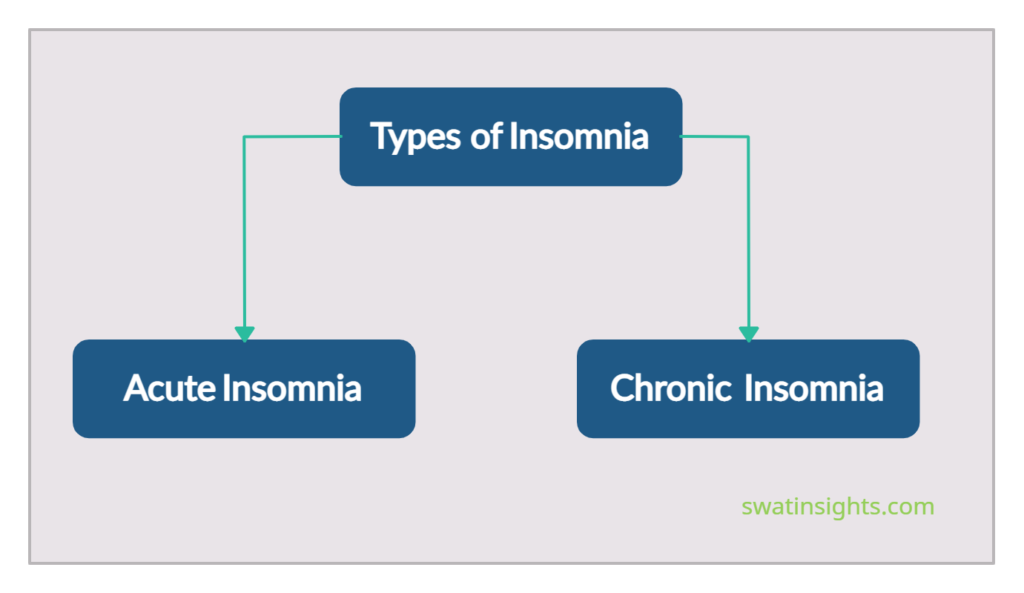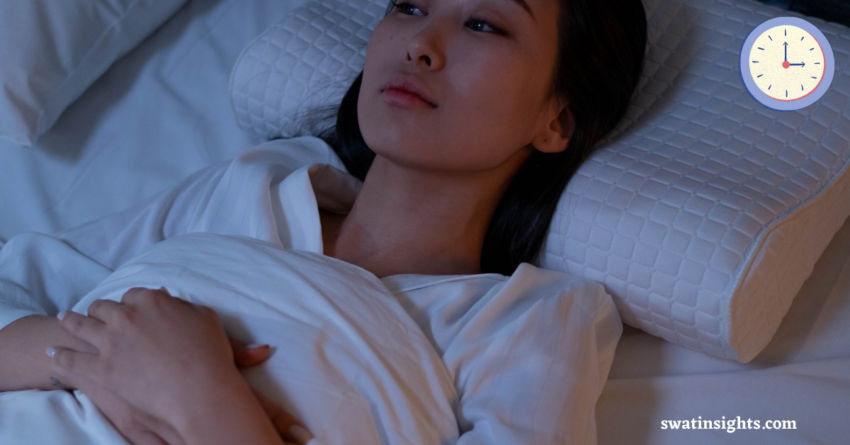Once in a while, everyone in their life experiences a sleep disorder. Insomnia is an inability to sleep or a lack of healthy sleep.
Insomnia affects both personal as well as professional life. It decreases the productive work capacity of a person.
Symptoms of Insomnia:
- Have difficulty –
- in falling asleep
- staying asleep
- falling back to sleep
- Late-night sleep
- Sleep broke frequently
- Waking up early morning
- Not feeling fresh and active after night’s sleep
- Feeling tired all day,
- Poor concentration
- Making mistakes even in routine work.
- Experience –
- anxiety, irritation, anger, depression, etc.
Types of Insomnia:

Acute or Transient:
Its causes are temporary, stay up to 3 months or less.
This sleep disorder doesn’t need any treatment. You can resolve it by managing stress and daily life activities.
Chronic:
The causes remain for more than three months/3 days or more per week. To treat this sleeping problem, you need to consult a doctor.
Some other types of insomnia are:
Adjustment: A major life-changing event triggers this type. It might be positive or negative. Remain for the short term.
For instance – Having new baby(positive) or job loss(negative).
Drug-induced: Intake of alcohol, caffeine, nicotine, or some medication.
Sleep onset: Trouble in sleep for the first 30 minutes or more. It is also known as delayed sleeping.
Middle: Awakes during sleep or difficulty in sleeping.
Late: Early wake up around dawn.
Behavioral: Found generally in children. Face difficulty in falling asleep, late-night awakening creates sleep disorders in children.
Paradoxical: Sleeping on the bed but awake for hours.
Sleep Hygiene: Poor sleeping habits.
For instance –
Use of mobile before bed(exposure to bright light), drinking alcohol or caffeine in the evening, etc.
Causes of Insomnia:
- Internally, everyone is dealing with stress, anxiety, relationship problems, career problems, etc.
Consequently, they develop a habit of overthinking even for trivial matters at the cost of sleep. It might cause sleeplessness if it persists for a longer time.
2. Excitement happens when you change the city or have something important to do the next day. Therefore, these thoughts make your mind active and awake you all night.
3. A Traveling issue like Jet lag disturbs the biological block. Insomnia, tiredness, mood swings are some of its side effects.
4. After a traumatic event, people have trouble sleeping. If the state remains for long, then it causes insomnia.
5. Physical pain like headache, back pain, joint pain, stomachache generally create problems in sleeping.
6. Chronic illness makes sleep disorders worse.
A person who suffers from heart problems, diabetes, Alzheimer’s Disease, a human immune virus(HIV) is more vulnerable to insomnia.
7. We tend to work late hours to meet the deadline, occasionally studying throughout the night during the examination.
But if this changes into a habit and becomes an excuse for less sleep might cause insomnia in the future.
In either case, avoid an undisciplined sleeping routine.
8. Eating unhealthy food or drinking caffeinated drinks or alcohol before bed affects sleep.
Food needs time to digest after every meal. So, try to avoid meals at least two hours before going to sleep.
9. Some medicines create alerting effect in the brain. Therefore, this side effect can wake you all night.
10. As we know, women face hormonal changes during menstruation. Furthermore, it creates tiredness and mood swings which cause sleeplessness.
11. Anxiety, stress, depression are Mental Health Disorders that generate insomnia.
12. A snoring partner can awake you or cause a problem in your sleep as well.
Risk Factors:
A person who suffers from a neurological condition and chronic disease.
Women because of the menstrual cycle, during pregnancy, and lactating mothers.
In busy life, people are unable to follow a disciplined routine.
Senior citizen because of health and aging issues.
Cures:
Cognitive Behavioral therapy
Our thoughts influence our feeling.
Feelings make our beliefs.
Beliefs decide our emotions.
But when these thoughts are negative, emotions (stress, anxiety, fear) dominate. It may cause sleep disorders.
Cognitive Behavioral therapy transforms these negative thoughts into productive ones.
It helps us to set goals. Moreover, it teaches you to find the good in all situations.
Relaxation techniques
We don’t have time for ourselves in our busy schedules. It creates pressure on our minds and body, which affects our sleep.
Breathing exercises help to reduce this stress.
Meditation releases our tension.
Exercise keeps us active all day.
Stress management
Stress is normal. But sometimes, it starts to control our thoughts at night. It results in sleeplessness.
Therefore, stress management therapy is required.
Medication
If nothing helps, you can take advice from a doctor.
Thank You.

1 thought on “Insomnia; What are its symptoms, types, causes, and cures?”